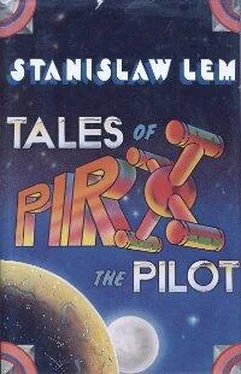But the little speck floating leisurely across the screen was white as could be, and Pirx could actually feel his eyeballs coming loose from their sockets. Not once did he blink, afraid that he might lose track of it if he did—but the white dot sauntered gingerly along, undisturbed, now only a dozen or so centimeters away from the opposite side of the screen. Another minute and it would vanish from sight.
Instinctively, Pirx’s hands went straight for the controls. The reactor, which had been idling, responded with instantaneous thrust, the acceleration shoving Pirx back into the seat’s foam-rubber cushion… stars scudding across the screen… the Milky Way running downhill, very much like a road of milk… This brought the mobile speck to a standstill, with the ship’s nose following right on its tail, aiming at it like a hunting dog pointing at a pheasant in the brush. Now was that classy handling, or wasn’t it?
The whole maneuver consumed a mere ten seconds.
Now, for the first time, he had the leisure to reflect, and it slowly dawned on him that what he was seeing was a hallucination, because such things were unprecedented. This deduction did him credit. On the whole, people tend to trust too much in the evidence of their senses; if they should happen to see a deceased acquaintance in public, they would sooner believe in a resurrection than admit to their own insanity.
Pilot Pirx groped in one of the seat’s side pockets, pulled out a small flask, inserted its two small glass tubes into his nostrils, and inhaled until his eyes began to water. Psychraine was potent enough to disrupt the cataleptic trances of a Yogi or the mystical visions of a saint. But, much to his chagrin, the light continued its peregrinations in the center of the left screen. Having done the prescribed thing, he returned the flask to its proper place, maneuvered the ship’s rudders slightly to align himself with the other, and checked the radar to get a fix on the luminous object.
And here he was in for his second shock: the meteoradar screen was blank. Its green tracing beam, incandescent as a strip of phosphorus exposed to a strong dose of solar radiation, swept around in a continuous circle, but without showing the slightest trace of any light—nothing. An absolute blank.
Pirx was not so foolish as to think that he was pursuing a spirit with a shining halo. The fact was, he didn’t believe in spirits, although occasionally, especially in the company of women, he might shoot the breeze about them, but even then it was not born of any spiritualistic convictions.
Of one thing he was sure: what he was following was not a dead celestial body, because such an object will always reflect a radar tracking beam, will always show up as a blip. Only objects that are artificially made and externally treated with a substance capable of absorbing, neutralizing, and dispersing centimeter waves will not produce any optical echoes.
Pilot Pirx cleared his throat and spoke deliberately, his Adam’s apple, with each measured phrase, bobbing up and down and pressing lightly against the laryngophone attached to his neck.
“Patrolship AMU-111 calling object flying in sector one-thousand-two-point-two, steering a course approaching sector one-thousand-four-hundred-four, and showing one navigation light. Request your call numbers. Over.”
He waited for the response.
Seconds passed, the seconds turned into minutes—still no answer. Instead, Pirx noticed that the light was fading, which meant it was receding. Although the radar telemeter had flunked the test, he still had the more primitive optical range finder in reserve. He stretched one leg, pushed a pedal, and the range finder, similar in appearance to a telescope, dropped down from above.
Pirx brought it up close to his eyes and adjusted the focus.
He located the dot immediately—and discovered something else while he was at it. Magnified now by the lens, the speck assumed the proportions of a pea when seen from a distance of 5 meters—which, by standards prevailing in outer space, was nothing short of gargantuan. Not only that, but its somewhat flattened surface was traversed by a number of tiny dark squiggles, much as if several thick black hairs were being pulled across the front lens. The squiggles were just as blurry and indistinct, though constantly in motion—always from right to left.
Pirx tried to increase the sharpness of the image, but the luminous speck adamantly refused to be focused; so, using a second prism, one designed especially for this purpose, he cut the image in two, brought the two halves together—with positive results—checked the scale, and received his third shock.
The shining object was only 4 kilometers away! This was equivalent to driving a racing car at top speed and suddenly discovering that 5 millimeters away from you is another car—in space, a proximity of 4 kilometers is just as lethal.
Pirx was running out of ammunition. He directed the outer thermocouple in the direction of the light, with the remote-control lever aimed the target finder straight at the milky-white dot, and read off the temperature out of the corner of his eye: 24 degrees Kelvin.
That meant the light had the same temperature as ambient space—25 degrees above absolute zero.
That cinched it. A luminous, self-propelled light in space? Never! But just because it was there, dead ahead of him, he gave chase.
The light was growing visibly—and rapidly—fainter. A minute later he verified that it had gained a full 100 kilometers on him. He increased his velocity.
Then the most uncanny thing of all happened.
First the light deliberately let him gain ground—letting him get within 80, 70, then 30 kilometers—before jumping out in front again. Pirx accelerated to 75 kilometers per second; the light, to 76. Pirx applied more thrust, but this time he didn’t pussyfoot around. He opened the jets to half-power, unleashing a powerful forward thrust; the triple gravity shoved him back into the seat’s padded cushion. His AMU had a small rest mass, its rate of acceleration being roughly equivalent to that of a racing car. Before long he was hitting 140.
The little light hit 140.5.
Pirx was beginning to feel hot and clammy. He applied maximum thrust. His AMU-111 hummed; his tachometer, whose readings were based on fixed stars, climbed steadily higher: 155… 168… 190… 200.
At 200 he took a peek through the range finder, which, considering the 4g , was a feat worthy of a decathlon athlete.
He was gaining on the light, which swelled in size as the gap between them closed to 20, then 10, and finally 3 kilometers, at which distance it looked larger than a pea when seen from an arm’s length away. The dark, blurry shapes continued to shunt across its surface, whose brightness was comparable to stars of the second magnitude—except that it resembled more a disk than a starlike dot.
His AMU-111 was giving everything it had, swelling Pirx with pride. During that sudden burst to maximum thrust, not a thing in the cabin had shaken—not a single vibration! The reaction was in the axis of acceleration; the jets were performing to perfection; the reactor was working like a champ.
The light kept closing in, though at a slower rate of speed. When it was no more than 2 kilometers off board, Pirx’s wheels began to turn.
The whole thing looked fishy as hell. A light, not attached to any terrestrial ship. Hm… Space pirates, maybe? What a laugh. Even if there were such things as space pirates, what would they be doing in such a godforsaken hole? The light had an extraordinary speed range; it could accelerate as sharply as it braked. And moody, too; first retreating, then letting itself be gradually overtaken. And that, more than anything, made him antsy. It was almost as if the thing were baiting him, stringing him along like a decoy, like a worm dangling on the end of a hook.
Читать дальше












